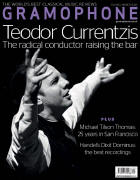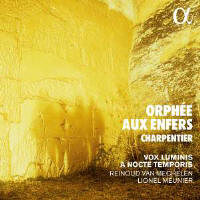Texte paru dans: / Appeared in: |
|
|
Outil de traduction (Très approximatif) |
|
|
Reviewer: Richard Lawrence Both of these pieces have been recorded before, but this seems to be the first time that they have appeared on the same disc. Orphée descendant aux enfers, usually described as a cantata, is more like an operatic scena. Through his singing and playing, Orpheus softens the torments that the shades of Tantalus and Ixion are undergoing in Hell. His instrument is not a lyre but a violin, whose ‘Récit d’Orphée’ comes after the Prelude; it’s followed by the first of Orpheus’s two solos, where the strings are joined by a recorder and a flute. Reinoud Van Mechelen declaims eloquently, rising to more passionate heights in the second air, ‘Vos plus grands criminels’. Equally expressive on rival recordings are Jason McStoots (CPO, 3/11) and Gérard Lesne (Zig-Zag Territoires, 7/07), the latter being a countertenor rather than an haute-contre. La descente d’Orphée aux enfers, lasting about an hour, was composed a couple of years later, in 1686 or 1687. A chamber opera, probably first performed at the mansion of Charpentier’s patron the Duchesse de Guise, it ends with a chorus of Shades bidding a regretful farewell to Orpheus after he has persuaded Pluto to restore Eurydice to life. Charpentier must have composed, or at least planned, a third act to round off the story. Apollo enters, as he does in Monteverdi’s Orfeo; but rather than raising his son to the heavens he encourages him to descend to the underworld. Orpheus has neither lyre nor violin: instead, he is accompanied by two bass viols, both when addressing the three shades – Ixion and Tantalus are joined by Tityus – and when putting his case to Pluto. The music for the viols is simply ravishing, and it’s beautifully played. Van Mechelen sings powerfully, with more than a touch of desperation. The other instruments of A Nocte Temporis provide excellent support, the dotted figures for the violin in the ‘Entrée des Fantômes’ (track 22) delivered with an engaging spikiness. The first act ends with a lively piece not to be found on the recordings from the Boston Early Music Festival (CPO, 9/14) or Les Arts Florissants (Erato, 5/96). Paul Agnew’s performance of Orpheus on the latter is unsurpassed; but anybody wanting these two pieces together need not hesitate in investing in these splendid new versions from Lionel Meunier and his team. |
|




